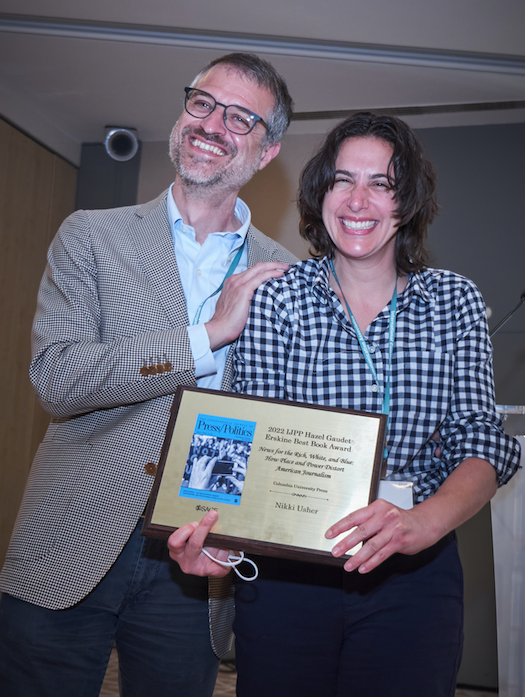PCR Awardee Questionnaire: IJPP Hazel Gaudet-Erskine Best Book Award (2022)

Name(s) & affiliation:
- Nikki Usher, PhD, University of San Diego
Project title:
- News for the Rich, White, and Blue: How Place and Power Distort American Journalism
Publication reference, link (APA 7th):
- Usher, N. (2021). News for the rich, white, and blue: How place and power distort American journalism. Columbia University Press.
Tell us something about you/your team and how and why you decided to focus on this research
- In 2016, after living and working in DC at the George Washington University, and watching Trump get elected despite all the news media predictions to the contrary, and watching a moral panic about declining trust in journalism, I realized that I had an intervention to make. My understanding of place as power only grew once I moved to the heartland (University of Illinois Urbana-Champaign). By understanding journalism through the lens of place, I could also critique how journalism reified power and how the political economy of the contemporary news industry meant increasingly unequal access to news and information for rural dwellers and marginalized communities in the urban US.
In 280 characters or less, summarize the main takeaway of your project.
- In the quest to survive, news organizations are realigning their priorities in ways that favor audiences who are willing to pay (rich, either in terms of cultural or actual capital), face huge barriers to diversifying and remain stubbornly white institutions, and increasingly, end up serving liberal blue audiences.
What made this project a “polcomm project”?
- This book is a story about journalism, power, and democracy, and provides a critical look at the way that elite, institutional news media are undermining democratic life through a refusal to consider blind spots that are only growing. In some ways, it is a classic polcomm project (including quantitative analyses of news provision and partisanship); in other ways, its roots in qualitative research and engagement with race, class, and geography and the focus on the newsroom as a starting point for considering power and democracy make it quite different from standard political communication work.
What, if anything, would you do differently, if you were to start this project again? (What was the most challenging part of this project? …& how did you overcome those challenges?)
- The most challenging part of this project was finishing a book during COVID. I do not understand how the book got finished, other than the fact that I woke up with a burning frustration every night and as a result, found time to write and edit with a small child home from school.
What other research do you currently see being done in this field and what would you like to see more of in the future?
- We often critique projects for being too US-centric. And I get that. But the US is the world’s oldest “representative” democracy, and the democratically-organized hijacking of democratic life by the Republican party is a story of organizing, information pollution, inequality, and racism that deserves deep engagement cross-culturally and cross-nationally.
What’s next? (Follow-up projects? Completely new direction?)
- Completely new direction: I’ve been awarded a Mellon New Directions Fellowship to pursue training in a second discipline in applied stats and economics. Who knows what happens next. Currently fascinated by tolerances for various levels of corruption in democracies and overall functioning (or not) and trust in democratic institutions.
PCR Awardee Questionnaire: IJPP Hazel Gaudet-Erskine Best Book Award (2022)
